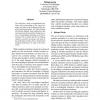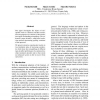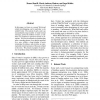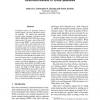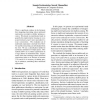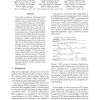NAACL
2010
13 years 9 months ago
2010
We evaluate the Berkeley parser on text from an online discussion forum. We evaluate the parser output with and without gold tokens and spellings (using Sparseval and Parseval), a...
NAACL
2010
13 years 9 months ago
2010
Conversational Agents have been shown to be effective tutors in a wide range of educational domains. However, these agents are often ignored and abused in collaborative learning s...
NAACL
2010
13 years 9 months ago
2010
In this paper, we compare two novel methods for part of speech tagging of Arabic without the use of gold standard word segmentation but with the full POS tagset of the Penn Arabic...
NAACL
2010
13 years 9 months ago
2010
We carried out a study on monolingual translators with no knowledge of the source language, but aided by post-editing and the display of translation options. On Arabic-English and...
NAACL
2010
13 years 9 months ago
2010
This paper investigates the impact of misspelled words in statistical machine translation and proposes an extension of the translation engine for handling misspellings. The enhanc...
NAACL
2010
13 years 9 months ago
2010
The goal of this work is to integrate query similarity metrics as features into a dense model that can be trained on large amounts of query log data, in order to rank query rewrit...
NAACL
2010
13 years 9 months ago
2010
In this paper, we focus on a recent Web trend called microblogging, and in particular a site called Twitter. The content of such a site is an extraordinarily large number of small...
NAACL
2010
13 years 9 months ago
2010
Translation systems are generally trained to optimize BLEU, but many alternative metrics are available. We explore how optimizing toward various automatic evaluation metrics (BLEU...
NAACL
2010
13 years 9 months ago
2010
There is significant evidence in the literature that integrating knowledge about multiword expressions can improve shallow parsing accuracy. We present an experimental study to qu...
NAACL
2010
13 years 9 months ago
2010
State-of-the-art Machine Translation (MT) systems are still far from being perfect. An alternative is the so-called Interactive Machine Translation (IMT) framework. In this framew...

